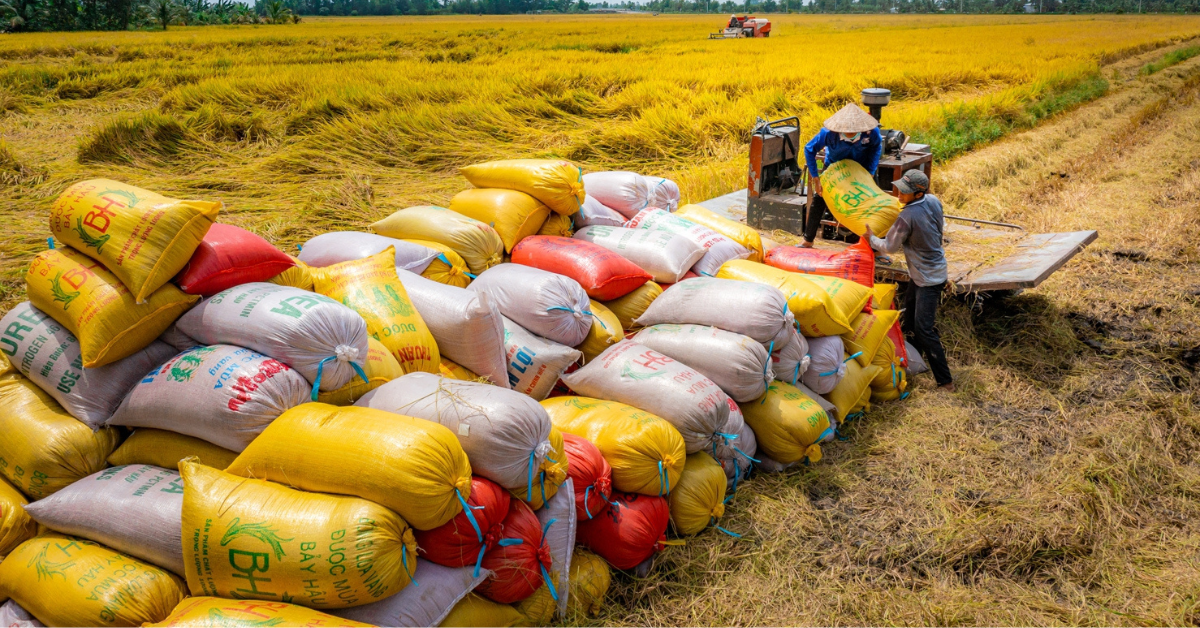PHILIPPINES SUSPENDS RICE IMPORTS, VIETNAM NEEDS A NEW STRATEGY
22 Sep 2025

How will the Philippines’ 60-day suspension of rice imports starting September 1/2025, affect Vietnam’s rice exports and the global market?
Philippines suspends rice imports: Will Vietnam’s rice prices be affected?
Vietnam’s rice export market and the role of the Philippines
According to data from the General Department of Vietnam Customs, by mid-August 2025, the country had exported nearly 5.88 million tons of rice, earning over USD 3 billion. Among these, the Philippines was the largest importer, accounting for 42% of total export turnover. This highlights the Philippines’ critical importance to Vietnam’s rice industry.
The Philippines’ 60-day suspension order and its short-term impact on Vietnam
Philippine President Ferdinand Marcos Jr. has just signed an order suspending rice imports for 60 days. According to Mr. Nguyễn Tuấn Việt, CEO of VIETGO, this move could have a significant short-term impact.
On average, Vietnam exports 300,000 tons of rice per month to this market. With the suspension, around 600,000 tons of rice will be affected, equivalent to 7% of Vietnam’s total annual rice exports.

Vietnam accounts for nearly 80% of the Philippines’ imported rice market share. Photo: Internet
The reason behind the Philippines’ decision
According to analysts, this move stems from disruptions in global rice trade. Major rice-exporting countries such as India and Thailand are adjusting prices to maintain their market share. Mr. Nguyễn Tuấn Việt noted: “When a country faces high tariffs in one market, it tends to lower prices in another to save its products. This has led to an oversupply in the Philippines, forcing the country to halt imports for adjustment”.
Solutions for Vietnam’s rice industry
In response to the situation, the Vietnam Food Association (VFA) has proposed that the Government and relevant ministries:
- Provide low - interest credit support for enterprises.
- Extend debt repayment deadlines and create favorable conditions for storage and reserves.
- The Ministry of Industry and Trade should send an official note to the Philippine Department of Agriculture to address difficulties.
These measures aim to ensure that Vietnamese enterprises can maintain stable rice export activities amid significant market fluctuations.
Enhancing quality and expanding markets: A strategic direction for Vietnamese rice
Vietnamese rice enterprises need to proactively seek new markets
In the context of continuous fluctuations in the global rice market, seeking new markets is considered a key solution to reduce dependence on traditional ones.
Export expert Nguyễn Tuấn Việt emphasized: Vietnamese enterprises need to proactively diversify their markets, as the concept of a “traditional rice market” will no longer be sustainable in the future. This is a decisive factor for the rice industry to maintain competitiveness and ensure long-term export stability.
Strategy to enhance the value of Vietnamese rice
Prime Minister Phạm Minh Chính has directed the Ministry of Agriculture and Environment to develop a concrete plan, urging rapid promotion of high - quality and organic rice exports, coupled with traceability systems and the building of a national brand. This is considered a strategic step to enhance the added value and global position of Vietnamese rice.

Enterprises showcasing export rice at a trade fair in Ho Chi Minh City. Photo: Internet
Positive achievements of Vietnam’s rice exports
Despite many challenges, Vietnam’s rice industry has still recorded positive signals. In July 2025 alone, exports were estimated at 750,000 tons, bringing the total for the first seven months to 5.5 million tons with an export turnover of USD 2.81 billion.
Notably, Vietnam has surpassed Thailand to become the world’s second-largest rice exporter, behind only India. This marks an important foundation for Vietnamese rice to further expand its markets and strengthen its position in the global supply chain.
Conclusion
The Philippines suspends rice imports highlights the risks of relying too heavily on a single market for Vietnam’s rice industry. In the context of global trade fluctuations, diversifying markets, improving product quality, and building a national rice brand are essential directions to ensure sustainable growth. With its recent achievements, strong government directives, and the determination of enterprises, Vietnam’s rice sector is well - positioned to turn challenges into opportunities and strengthen its standing in the international rice market.
Views
530
